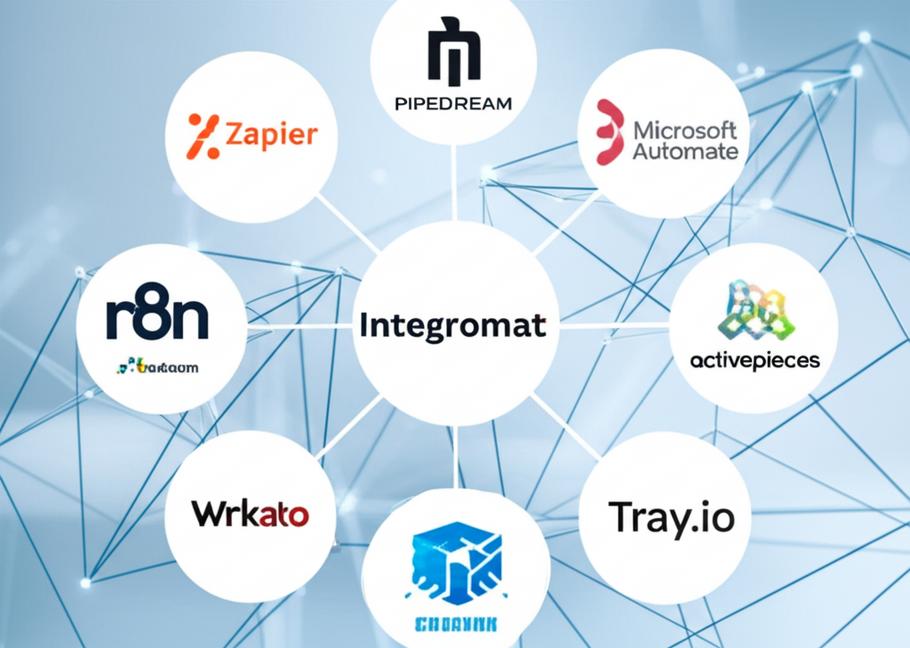Integromat Alternatives: Top Automation Platforms for Your Business

Integromat Alternatives: Finding the Right Automation Platform
Integromat, now known as Make, is a powerful integration platform as a service (iPaaS) that allows businesses to automate workflows by connecting different apps and services. However, it might not be the perfect fit for everyone. This article explores some of the best Integromat alternatives, helping you find the right automation platform for your specific needs.
Why Look for an Integromat Alternative?
Before diving into the alternatives, let’s consider why you might be looking for one in the first place:
- Pricing: Integromat’s pricing structure can be complex, especially for high-volume users. Some alternatives offer more transparent or cost-effective plans.
- Complexity: While Integromat offers advanced features, its visual interface can be overwhelming for beginners. Simpler platforms might be easier to learn and use.
- Specific Integrations: Integromat might not support all the apps and services you need to connect. Alternatives might offer better integration options for your tech stack.
- Features: Certain platforms may offer unique features that Integromat lacks, such as built-in data transformation tools or advanced error handling.
Top Integromat Alternatives
Here are some of the top alternatives to Integromat, along with their key features, pros, and cons:
1. Zapier
Zapier is arguably the most popular iPaaS platform, known for its ease of use and extensive app integrations. It’s a great option for businesses of all sizes.
- Key Features:
- Visual workflow builder (Zaps)
- Support for 5,000+ apps
- Built-in apps for data transformation and scheduling
- User-friendly interface
- Pros:
- Easy to learn and use
- Large app ecosystem
- Good for simple to moderately complex workflows
- Cons:
- Can be expensive for high-volume tasks
- Limited advanced features compared to Integromat
Example: Automatically save new attachments from Gmail to Google Drive using Zapier. (https://zapier.com/)
2. n8n
n8n is a free and open-source workflow automation platform that you can self-host or use as a cloud service. It’s a powerful and flexible option for developers and technical users.
- Key Features:
- Node-based workflow editor
- Support for custom integrations
- Self-hosting option for complete control
- Extensible with JavaScript
- Pros:
- Free and open-source (self-hosted)
- Highly customizable
- Suitable for complex workflows
- Cons:
- Requires technical expertise
- Steeper learning curve than Zapier
- Self-hosting requires maintenance
Example: Building a custom CRM integration using n8n. (https://n8n.io/)
3. Pipedream
Pipedream is a low-code integration platform designed for developers. It allows you to build and run event-driven workflows with serverless code.
- Key Features:
- Code-based workflow editor
- Support for Node.js, Python, and other languages
- Built-in serverless environment
- Event-driven architecture
- Pros:
- Flexible and powerful
- Ideal for complex integrations
- Free tier available
- Cons:
- Requires coding knowledge
- Less user-friendly for non-developers
Example: Processing data from an API in real-time with Pipedream. (https://pipedream.com/)
4. Microsoft Power Automate
Microsoft Power Automate (formerly Microsoft Flow) is a cloud-based automation platform tightly integrated with the Microsoft ecosystem. It’s a good option for businesses heavily reliant on Microsoft products.
- Key Features:
- Visual workflow builder
- Integration with Microsoft Office 365, Dynamics 365, and other Microsoft services
- Pre-built templates for common workflows
- AI-powered automation features
- Pros:
- Seamless integration with Microsoft products
- Affordable pricing for Microsoft users
- Good for automating tasks within the Microsoft ecosystem
- Cons:
- Limited integration with non-Microsoft apps
- Can be complex to manage for large organizations
Example: Automating email responses and calendar events using Power Automate. (https://powerautomate.microsoft.com/)
5. Workato
Workato is an enterprise-grade iPaaS platform designed for complex integrations and large organizations. It offers advanced features for data governance, security, and compliance.
- Key Features:
- Low-code/no-code workflow builder
- Advanced data mapping and transformation tools
- Robust security and compliance features
- Support for enterprise applications
- Pros:
- Suitable for complex integrations
- Strong security and compliance
- Scalable for large organizations
- Cons:
- Expensive for small businesses
- Steeper learning curve than Zapier
Example: Integrating multiple enterprise systems with Workato. (https://www.workato.com/)
6. Automate.io
Automate.io is a user-friendly iPaaS platform that focuses on simplicity and ease of use. It’s a good option for small businesses and teams that need to automate basic workflows.
- Key Features:
- Visual workflow builder
- Support for popular apps and services
- Pre-built templates for common workflows
- Affordable pricing
- Pros:
- Easy to learn and use
- Good for basic automation tasks
- Affordable for small businesses
- Cons:
- Limited advanced features
- Fewer integrations than Zapier
7. Tray.io
Tray.io is a low-code automation platform that allows businesses to build custom integrations and workflows. It’s a flexible and powerful option for developers and technical users.
- Key Features:
- Visual workflow builder with code-based options
- Support for custom connectors
- Advanced data transformation tools
- Embedded iPaaS option
- Pros:
- Highly customizable
- Suitable for complex integrations
- Good for developers
- Cons:
- Requires technical expertise
- More expensive than Zapier
8. Activepieces
Activepieces is an open-source, no-code automation platform that enables users to connect various applications and automate workflows. It emphasizes community-driven development and offers both cloud-hosted and self-hosted options.
- Key Features:
- Visual flow designer.
- Cloud or Self-hosting
- Growing number of integrations
- Open Source.
- Pros:
- Open Source and Free.
- Easy to use visual interface.
- Growing community and integrations.
- Cons:
- Still under active development.
- Fewer integrations compared to established players like Zapier.
Choosing the Right Platform
When choosing an Integromat alternative, consider the following factors:
- Your technical skills: Are you comfortable with coding, or do you prefer a visual interface?
- Your budget: How much are you willing to spend on an automation platform?
- Your integration needs: Which apps and services do you need to connect?
- Your workflow complexity: How complex are your automation workflows?
- Your business size: Do you need an enterprise-grade platform or a simpler solution for small businesses?
By carefully evaluating these factors, you can find the right Integromat alternative to streamline your workflows and improve your business efficiency.
Ebiz: Streamlining Business Operations
While exploring automation platforms for connecting various apps and services, consider also streamlining your core business operations with efficient software solutions. Ebiz offers a comprehensive suite of tools to manage your point of sale, inventory, customer relationships, and more. Check out the POS Ebiz store for a variety of solutions tailored to your business needs:
https://www.phanmempos.com/cua-hang
This can complement your automation efforts by ensuring your internal processes are as optimized as your external integrations.
Conclusion
There are many great Integromat alternatives available, each with its own strengths and weaknesses. By carefully considering your needs and evaluating the options, you can find the perfect platform to automate your workflows and improve your business productivity.

